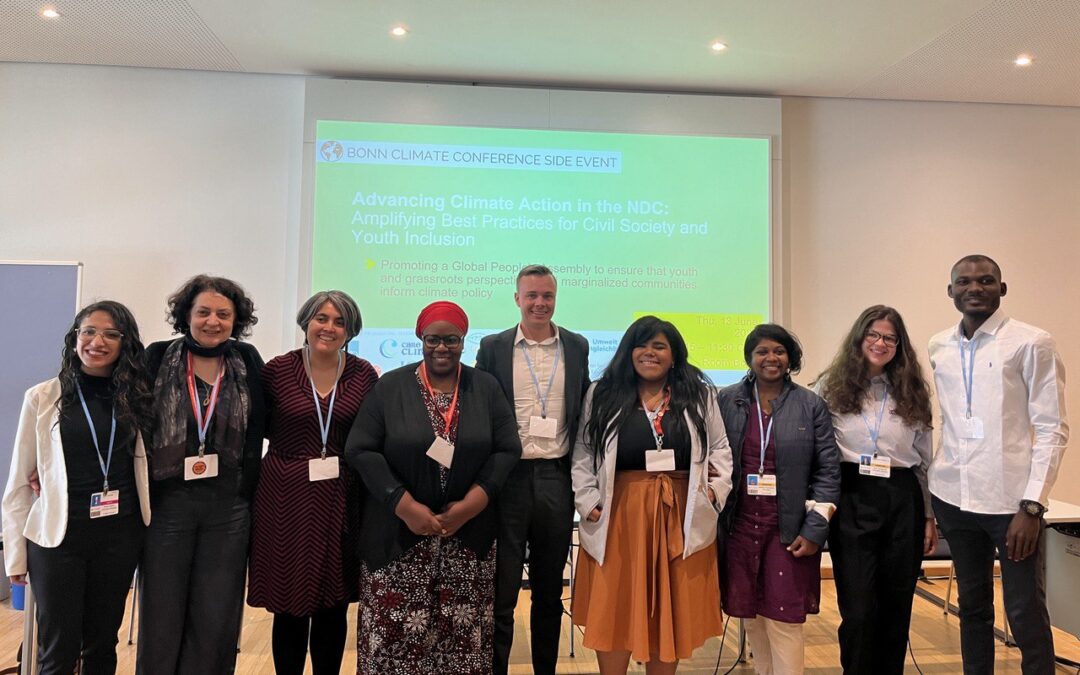After two intense weeks at the SB60 conference, cambiaMO was thrilled to wrap up these weeks with a side event on Advancing Climate Action in the Nationally Determined Contributions (NDC), on the 13th of June. In this amazing session dedicated to promoting a Global People’s Assembly, we had the privilege of listening to the inspiring testimonies of various speakers from different backgrounds.
Moderated by Joseph Bruke, from the Universal Rights Group, the event focused on amplifying best practices for civil society and youth inclusion, leveraging grassroots participation in UNFCCC processes like the NDCs, and promoting a Global People’s Assembly for the next Global Stocktake (GST). Mwanahamisi Singano, Senior Policy Lead at WEDO and Co-Focal point of the WGC, highlighted the need for civil society engagement and the importance of the assembly in capturing the voices of those most affected by climate change. Maria Cristina Cifuentes, party representative of Colombia, discussed her country’s inclusive approach to updating NDCs through local community involvement and roundtable discussions. Johanna Arriagada, the party representative of Chile, shared her country’s methodology for integrating participatory processes into environmental policy, including the Escazú Agreement.
Floridea Di Ciommo, director of cambiaMO, after presenting the key elements of a Climate assembly, emphasized the need for deliberation over consultation in climate action and the importance of political willingness and financial means for guaranteeing inclusive participation. The rapid-fire session featured speakers like Babitha P.S., activist and member of the women and gender Constituency Facilitators committee, who stressed the importance of common language and political will in grassroots dialogues, and Ana Carolina Siqueira from Care About Climate, who highlighted the role of youth in climate processes and the need for actionable involvement.
The final panel discussions underscored the necessity of participatory tools like Climate Assemblies to generate actionable recommendations for NDCs. Misi Singano spoke on this need, while Maria Cristina Cifuentes explained Colombia’s bottom-up strategies for NDC development, including children’s participation, focusing on educational approaches and capacity building. Johanna Arriagada detailed Chile’s participatory processes and the integration of local and global perspectives.
In her closing remarks, Isatis M. Cintron-Rodriguez of ACE Observatory and researcher at Columbia University advocated for deliberative democracy tools to ensure inclusive, transparent, and balanced decision-making for equitable and ambitious outcomes. She emphasized the need for resources and coherence between national and international levels. The event highlighted the critical role of grassroots participation in global climate policy. As we move forward, it’s essential to ensure that the process is not only inclusive but also people-centric, incorporating human rights, youth, and social responsiveness. We need to ensure the necessary resources are allocated to support these participatory frameworks, bridging the gap between local experiences and global policy decisions. Let’s continue to work together to make these inclusive and participatory processes a reality, ensuring that the voices of marginalized communities are heard and valued in the fight against climate change.







